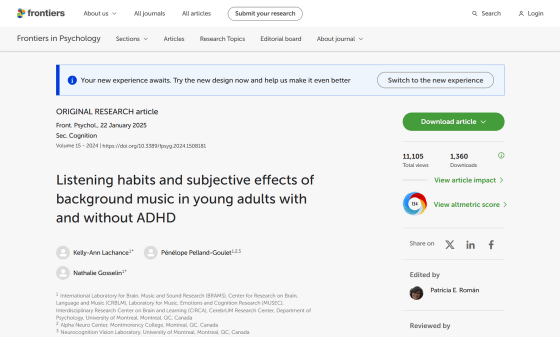Research shows that young people with ADHD have different music listening habits than those without.

A study has found that young people with
Frontiers | Listening habits and subjective effects of background music in young adults with and without ADHD
https://www.frontiersin.org/journals/psychology/articles/10.3389/fpsyg.2024.1508181/full

Study reveals distinct music habits among young adults with ADHD symptoms
https://www.psypost.org/study-reveals-distinct-music-habits-among-young-adults-with-adhd-symptoms/
Symptoms of ADHD often persist into adulthood, and those with the inattentive type, in particular, may have difficulty concentrating, managing tasks, and organizing. While medications such as Concerta and Strattera are available to alleviate ADHD symptoms, some researchers are also investigating alternative strategies, including environmental adjustments such as playing background music.
Kelly Ann Lachance, a doctoral student in the Department of Psychology at the University of Montreal in Canada, and her colleagues investigated how young people use music in their daily lives and how young people with ADHD symptoms differ from typically developing people.
The research team stated, 'We were interested in how young people with and without ADHD use background music in their daily lives, particularly in cognitively demanding activities, because few previous studies have investigated their actual listening habits.'

The researchers conducted an online survey of 434 participants aged 17 to 34. They were asked about their music listening habits and preferences, as well as the effects of background music on their emotions and cognitive function. They also administered a standardized screening tool for ADHD symptoms, and based on their responses, participants were divided into two groups: those with ADHD symptoms and those without ADHD symptoms.
The survey found that many young people listen to music in the background not only during cognitively demanding tasks like studying, problem-solving, and reading, but also during less cognitively demanding tasks like cleaning, cooking, and exercise.
However, participants classified as having ADHD symptoms were more likely to play background music while studying, exercising, or performing tasks that generally did not involve high cognitive load.
'Interestingly, we observed clear differences between the groups. Participants with ADHD symptoms not only listened to music more frequently during learning tasks, but also preferred stimulating music for both high and low cognitively demanding activities,' the researchers wrote in a statement to PsyPost. 'In contrast, neurologically normal participants tended to prefer relaxing music during cognitively demanding activities and stimulating music during less demanding tasks.'
When asked whether music improved their concentration or mood while performing cognitive tasks, most participants reported that music helped improve their concentration and mood. However, contrary to expectations, there was no significant difference between the groups with and without ADHD symptoms.

' The Moderate Brain Arousal model, a psychological theory, suggests that the brains of people with ADHD have a lower-than-baseline arousal level and may use external stimuli, such as music, to bring their brains to the arousal state necessary for task performance. The results of this study support this theory, suggesting that people with ADHD may use music not just as a daily activity, but as a strategy to satisfy their need for stimulation.'
PsyPost stated, 'For people with attention challenges, music may serve as a flexible, self-directed tool to help regulate alertness, reduce boredom, and support performance. Future studies could build on these results by conducting laboratory experiments and examining how different types of music affect cognitive function and emotions in people with ADHD.'
Related Posts:
in Science, Posted by log1h_ik







